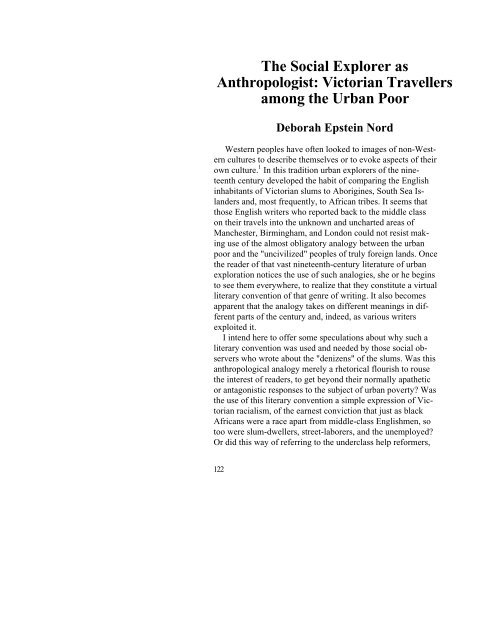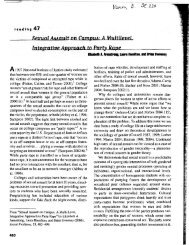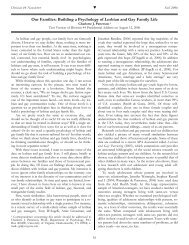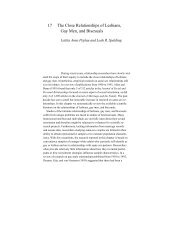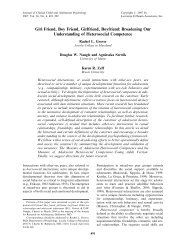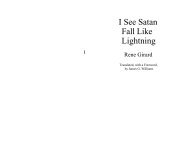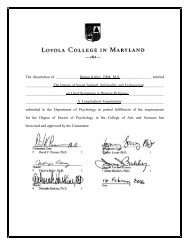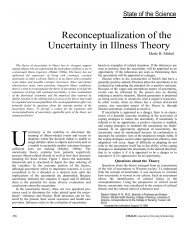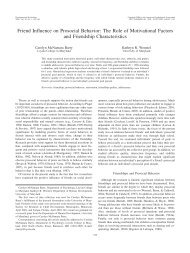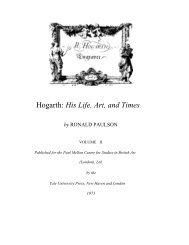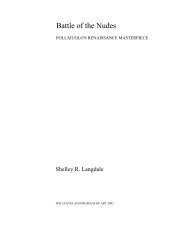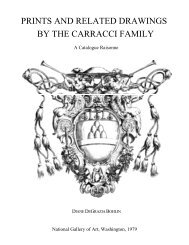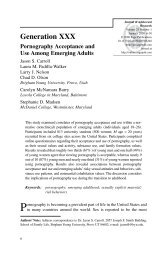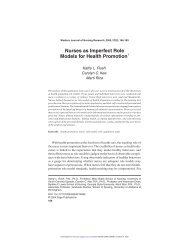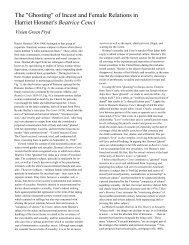The Social Explorer as Anthropologist: Victorian Travellers among ...
The Social Explorer as Anthropologist: Victorian Travellers among ...
The Social Explorer as Anthropologist: Victorian Travellers among ...
You also want an ePaper? Increase the reach of your titles
YUMPU automatically turns print PDFs into web optimized ePapers that Google loves.
<strong>The</strong> <strong>Social</strong> <strong>Explorer</strong> <strong>as</strong><br />
<strong>Anthropologist</strong>: <strong>Victorian</strong> <strong>Travellers</strong><br />
<strong>among</strong> the Urban Poor<br />
Deborah Epstein Nord<br />
Western peoples have often looked to images of non-West-<br />
ern cultures to describe themselves or to evoke <strong>as</strong>pects of their<br />
own culture. 1 In this tradition urban explorers of the nine-<br />
teenth century developed the habit of comparing the English<br />
inhabitants of <strong>Victorian</strong> slums to Aborigines, South Sea Is-<br />
landers and, most frequently, to African tribes. It seems that<br />
those English writers who reported back to the middle cl<strong>as</strong>s<br />
on their travels into the unknown and uncharted are<strong>as</strong> of<br />
Manchester, Birmingham, and London could not resist mak-<br />
ing use of the almost obligatory analogy between the urban<br />
poor and the "uncivilized" peoples of truly foreign lands. Once<br />
the reader of that v<strong>as</strong>t nineteenth-century literature of urban<br />
exploration notices the use of such analogies, she or he begins<br />
to see them everywhere, to realize that they constitute a virtual<br />
literary convention of that genre of writing. It also becomes<br />
apparent that the analogy takes on different meanings in dif-<br />
ferent parts of the century and, indeed, <strong>as</strong> various writers<br />
exploited it.<br />
I intend here to offer some speculations about why such a<br />
literary convention w<strong>as</strong> used and needed by those social ob-<br />
servers who wrote about the "denizens" of the slums. W<strong>as</strong> this<br />
anthropological analogy merely a rhetorical flourish to rouse<br />
the interest of readers, to get beyond their normally apathetic<br />
or antagonistic responses to the subject of urban poverty? W<strong>as</strong><br />
the use of this literary convention a simple expression of Vic-<br />
torian racialism, of the earnest conviction that just <strong>as</strong> black<br />
Africans were a race apart from middle-cl<strong>as</strong>s Englishmen, so<br />
too were slum-dwellers, street-laborers, and the unemployed?<br />
Or did this way of referring to the undercl<strong>as</strong>s help reformers,<br />
122
journalists, and social investigators to communicate some-<br />
thing of significance to their readers that they otherwise might<br />
have found difficult to convey? I will begin to try to answer<br />
these questions by looking at the literature of urban explo-<br />
ration produced at the end of the century and work my way<br />
back to mid-century, ending with Henry Mayhew, in many<br />
ways the most important urban explorer of his time.<br />
<strong>The</strong> England/Africa analogy appeared most prevalently in<br />
writings of the 1880s and 1890s, those late-<strong>Victorian</strong> decades<br />
in which poverty w<strong>as</strong> "rediscovered" <strong>as</strong> a national issue and<br />
in which numerous middle-cl<strong>as</strong>s explorers traveled into the<br />
terra incognita of urban slums, particularly those of the E<strong>as</strong>t<br />
End of London. A serious economic depression had hit Eng-<br />
land—and the rest of Western Europe—at the end of the<br />
1870s; and throughout the 1880s unemployment, labor un-<br />
rest, sporadic working-cl<strong>as</strong>s violence, and the birth of the "new<br />
unionism" (the organization of unskilled workers) fed middle-<br />
cl<strong>as</strong>s fears of social upheaval and prompted what w<strong>as</strong> called<br />
the "socialist revival." <strong>Social</strong>ist groups like the <strong>Social</strong> Demo-<br />
cratic Federation and the Fabians sought to analyze the causes<br />
of poverty; reform-minded professionals like Charles Booth<br />
mounted inquiries into the actual extent of poverty in English<br />
society; and journalists like W. T. Stead of the Pall Mall Gazette<br />
published exposes of slum housing, sweat shops, and the white<br />
slave trade.<br />
Just <strong>as</strong> Manchester had been the focus for national interest<br />
in the ugly urban results of industrialization in the 1840s and<br />
1850s, so the E<strong>as</strong>t End became the chief symbolic example of<br />
urban decay in the 1880s and 1890s. In 1845 Disraeli warned<br />
that England had become divided into two nations, "rich and<br />
poor," and in 1891 Margaret Harkness, chronicler of work-<br />
ing-cl<strong>as</strong>s life in London slums, echoed and amended Disraeli<br />
by identifying "two nations, E<strong>as</strong>t and West." 2 What had long<br />
been an actual physical contr<strong>as</strong>t between the prosperous West<br />
End and the more solidly working-cl<strong>as</strong>s E<strong>as</strong>t End w<strong>as</strong>, in these<br />
l<strong>as</strong>t decades of the century, turned into what Raymond Wil-<br />
liams calls an "interpretive image": the West represented all<br />
that w<strong>as</strong> bright, open, dazzling, and enlightened; the E<strong>as</strong>t all<br />
that w<strong>as</strong> dark, labyrinthine, threatening, and benighted. 3<br />
123
<strong>The</strong> dichotomy of West and E<strong>as</strong>t doubled, of course, for<br />
England and its Empire. 4 <strong>The</strong> era of the "rediscovery" of<br />
poverty w<strong>as</strong> also the heyday of British Imperialism. <strong>The</strong> Great<br />
Depression at home and competition from Germany and the<br />
United States abroad gave Britain the impetus to expand trade<br />
and investment in its colonies; and the search for new markets<br />
in Africa and Asia brought in its wake missionaries, explorers,<br />
anthropologists, and travelers. <strong>The</strong>y penetrated the "dark"<br />
continents in an effort to learn, conquer, and convert; and<br />
they captured the imaginations of an audience at home, eager<br />
for tales of exotic and torturous journeys, wild tribes, and<br />
miraculous conversions.<br />
<strong>The</strong> literature of urban exploration depended in fact on this<br />
heightened interest in the Empire for much of its language,<br />
its form, its legitimacy, and its moral authority. In How the<br />
Poor Live George Sims, one of the better known popular social<br />
investigators of the 1880s, began a section on slum dwellings<br />
in this way:<br />
In these pages I propose to record the result of a journey into<br />
a region which lies at our own doors—into a dark continent<br />
that is within e<strong>as</strong>y walking distance of the General Post Office.<br />
This continent will, I hope, be found <strong>as</strong> interesting <strong>as</strong> any of<br />
those newly-explored lands which engage the attention of the<br />
Royal Geographical Society—the wild races who inhabit it will,<br />
I trust, gain public sympathy <strong>as</strong> e<strong>as</strong>ily <strong>as</strong> those savage tribes for<br />
whose benefit Missionary Societies never ce<strong>as</strong>e to appeal for<br />
funds. 5<br />
If you can summon interest in and sympathy for "wild races"<br />
far away, Sims seems to be saying, then you can at le<strong>as</strong>t read<br />
what I have to say about those neglected people in your very<br />
midst. Sims is clearly using a rhetorical device to capture the<br />
attention of his readers, to enhance the exotic and even sen-<br />
sational quality of his squalid researches, but he is also ad-<br />
monishing the English public for its wilful ignorance of<br />
Whitechapel and Bethnal Green and for its facile enthusi<strong>as</strong>m<br />
for alien cultures.<br />
A decade or so later Jack London expressed a similar sen-<br />
timent with a somewhat sharper ironic edge in his People of<br />
the Abyss. "O Cook, O Thom<strong>as</strong> Cook & Son," he apostrophized,<br />
124
path-finders and trail-clearers, living sign-posts to all the world,<br />
and bestowers of first aid to bewildered travellers—unhesitat-<br />
ingly and instantly, with e<strong>as</strong>e and celerity, could you send me<br />
to Darkest Africa or Innermost Tibet, but to the E<strong>as</strong>t End of<br />
London, barely a stone's throw distant from Ludgate Circus,<br />
you know not the way! 6<br />
While England gloried in its expanding Empire and spread<br />
"civilization" throughout the world, it forgot or never knew<br />
the hungry, unemployed, and poorly-housed denizens of its<br />
own cities. Jack London reminded his readers what and where<br />
the E<strong>as</strong>t End w<strong>as</strong>: if the Empire never saw the setting of the<br />
sun, he quipped, the E<strong>as</strong>t End w<strong>as</strong> that place over which the<br />
sun seldom rose.<br />
<strong>The</strong> domestic social reformer who made his dependence<br />
on the African example most explicit w<strong>as</strong> General William<br />
Booth, founder of the Salvation Army. In the summer of 1890<br />
an explorer named Stanley—of Stanley and Livingstone<br />
fame—had published In Darkest Africa, an account of his jour-<br />
ney across the "Lost Continent." Later that same year General<br />
Booth came out with a book outlining his plan for the allevia-<br />
tion of poverty in Great Britain: he called it In Darkest England<br />
and the Way Out. Booth begins this work with an account of<br />
Stanley's heroic entry into the "almost impenetrable" tropical<br />
forests of the Congo and his discovery of its predatory and<br />
godless population, and then interrupts his narrative to <strong>as</strong>k<br />
the inevitable question: "As there is a darkest Africa is there<br />
not also a darkest England? . . . May we not find a parallel at<br />
our own doors, and discover within a stone's throw of our<br />
cathedrals and palaces similar horrors to those which Stanley<br />
h<strong>as</strong> found existing in the great Equatorial forest?" 7<br />
He introduces the already familiar analogy much <strong>as</strong> George<br />
Sims and Jack London did, but he takes it a step further by<br />
equating the Arab ivory raiders who exploit African forest<br />
dwellers with those Englishmen (he singles out pub-owners)<br />
who prey on the vulnerabilities of slum dwellers and unwit-<br />
tingly reduce them to criminals, drunkards, and layabouts.<br />
Booth suggests that the Englishman's guilt goes beyond mere<br />
ignorance of his poorer neighbors: he causes eternal misery,<br />
"brooding sullenness" and "dull despair"; he is a slave-driver<br />
125
and an agent of godlessness.<br />
It is clear from these examples of the 1880s and 1890s that<br />
the language of domestic social investigation cannot be fully<br />
understood without an appreciation of England's place in the<br />
constellation of world politics, that England's national con-<br />
cerns—and the way they were discussed—were inseparable<br />
from its international ones. London had become the center<br />
of an empire, the docks of E<strong>as</strong>t London the conduit through<br />
which the Empire entered Britain; and the capital took on an<br />
aura of new and literal—not just metaphorical—internation-<br />
alism in these decades. Waves of immigrants gravitated to<br />
London's central districts while native Londoners tended to<br />
spread out into the new suburbs and outlying are<strong>as</strong>. <strong>The</strong> "dis-<br />
tant tribes" had more than an analogous relationship to Lon-<br />
doners: they had become Londoners, <strong>as</strong> London came to<br />
reproduce in miniature the world of the Empire. When Mar-<br />
garet Harkness wrote a novel about the Salvation Army, she<br />
quite appropriately followed the lead of General Booth by<br />
calling her book In Darkest London, further narrowing the fo-<br />
cus of Booth's own title from benighted nation to benighted<br />
city. She opened the novel with a description of Whitechapel<br />
Road on a Saturday night:<br />
<strong>The</strong>re one sees all nationalities. A grinning Hottentot elbows<br />
his way through a crowd of long-legged Jewesses. An Algerian<br />
merchant walks arm-in-arm with a native of Calcutta. A little<br />
Italian plays pitch-and-toss with a small Russian. A Polish Jew<br />
enjoys sauer-kraut with a German Gentile. And <strong>among</strong> the for-<br />
eigners lounges the E<strong>as</strong>t End loafer, monarch of all he surveys,<br />
lord of the premises. 8<br />
<strong>The</strong> E<strong>as</strong>t End thoroughfare h<strong>as</strong> become a Babel, a world<br />
in microcosm. <strong>The</strong> Jew, the E<strong>as</strong>tern European, or the Med-<br />
iterranean is <strong>as</strong> alien to the Englishman <strong>as</strong> the Hottentot or<br />
the Pygmy; and each nationality is perceived <strong>as</strong> a cluster of<br />
stereotypical traits, each individual foreigner a caricature. <strong>The</strong><br />
Empire brought with it into England the ironic coupling of<br />
great riches and great poverty; in this way it reproduced the<br />
dichotomy of West End luxury and E<strong>as</strong>t End squalor.<br />
<strong>The</strong> literary convention of comparing the urban poor of<br />
England with Africans or other non-Western peoples w<strong>as</strong> not,<br />
126
however, a new one in the 1880s. To be sure, it w<strong>as</strong> widely<br />
exploited in the l<strong>as</strong>t decades of the century because of the<br />
particular political and social circumstances of the period, but<br />
it w<strong>as</strong> by then an already available and well-established con-<br />
vention. We have to look to earlier examples of this practice,<br />
therefore, for a fuller understanding of its various meanings.<br />
We remember, of course, the "Telescopic Philanthropy" chap-<br />
ter in Dickens' Bleak House: Mrs. Jellyby devotes herself to the<br />
natives of Borioboola-Gha on the left bank of the Niger, <strong>as</strong><br />
well <strong>as</strong> to the cultivation of the coffee berry and the settlement<br />
of 200 "superfluous" British families there, while her own<br />
children fall down stairs, get their heads stuck between iron<br />
railings, and generally suffer neglect and misery at their moth-<br />
er's hands. Mrs. Jellyby, now often seen <strong>as</strong> Dickens' belittling<br />
parody of the socially engaged female, functions primarily <strong>as</strong><br />
Dickens' indictment of the insensitive, myopic philanthropist.<br />
Her children represent not only the proper sphere of wom-<br />
anhood but the proper sphere of the reforming middle cl<strong>as</strong>s:<br />
the poor of England. 9 Some eight years before Dickens began<br />
Bleak House, Friedrich Engels cited the remarks of an E<strong>as</strong>t<br />
End clergyman in his Condition of the Working Cl<strong>as</strong>s: " 'I be-<br />
lieve,' " recorded the Reverend G. Alston in the Weekly Dis-<br />
patch, " 'that till the Bishop of London called the attention of<br />
the public to the state of Bethnal-green, about <strong>as</strong> little w<strong>as</strong><br />
known at the West-end of this most destitute parish <strong>as</strong> the<br />
wilds of Australia or the islands of the South Se<strong>as</strong>.' " 10 As early<br />
<strong>as</strong> 1844, then, the division of E<strong>as</strong>t and West and the veil of<br />
ignorance that presumably separated one part of London from<br />
the other were acknowledged by writers on urban poverty <strong>as</strong><br />
social realities.<br />
Both Dickens and Engels anticipated the later writers I<br />
have mentioned by admonishing their readers for ignoring<br />
what existed under their noses, for shutting out the misery<br />
around the corner while sentimentalizing the plight of those<br />
oceans away. But the real m<strong>as</strong>ter of the particular analogy I<br />
have been discussing in the mid-<strong>Victorian</strong> decades w<strong>as</strong> Henry<br />
Mayhew, the author of London Labour and the London Poor. It<br />
is his work that contains the most sustained and, I believe,<br />
the most purposeful use of the analogy. He not only employed<br />
127
the rhetorical strategies I have already discussed, but he chose<br />
to adopt the persona of the anthropologist.<br />
Mayhew, a satirist, journalist, amateur actor, and member<br />
of the literary bohemia of the 1830s and 1840s (of which<br />
Dickens and George Cruikshank were also a part), w<strong>as</strong> <strong>as</strong>ked<br />
to undertake a series of articles on the conditions of the<br />
London working poor for the Morning Chronicle in 1849. <strong>The</strong><br />
Chronicle appointed a number of journalists to cover various<br />
industrial cities throughout England, and Mayhew w<strong>as</strong> made<br />
"Special Correspondent from the Metropolis." 11 <strong>The</strong> paper,<br />
which had liberal, reformist leanings, responded to the grow-<br />
ing middle-cl<strong>as</strong>s interest in problems of poverty and urban<br />
life in general. <strong>The</strong> cholera epidemic of 1849, which claimed<br />
the lives of the urban poor in far greater numbers than the<br />
rest of the population, served to focus even greater attention<br />
on the social issues already brought to public consciousness<br />
by the Depression of the early 1840s, by the Chartist Move-<br />
ment, and by the publication in 1842 of Edwin Chadwick's<br />
Poor Law Commission report on the sanitary conditions af-<br />
fecting the urban poor. <strong>The</strong> middle cl<strong>as</strong>s reacted to these<br />
phenomenon of the decade with fear of social unrest, with<br />
some me<strong>as</strong>ure of repugnance, and with an often hesitant<br />
desire for reform.<br />
Mayhew continued to publish his "letters" from the Me-<br />
tropolis in the Chronicle for just over a year until, in December<br />
of 1850, he broke with the paper and began to issue articles<br />
from an office of his own in twopenny weekly parts. In 1851-<br />
52 the pieces were bound together for publication <strong>as</strong> London<br />
Labour and the London Poor, and a four-volume edition w<strong>as</strong><br />
re-issued in 1861-62. In the Preface to the bound volumes<br />
Mayhew identified himself <strong>as</strong> a "traveller in the undiscovered<br />
country of the poor," who will supply information "concern-<br />
ing a large body of persons of whom the public had less<br />
knowledge than of the most distant tribes of the earth." 12<br />
<strong>The</strong>se remarks, <strong>as</strong> should by now be obvious, are not unusual<br />
and do not distinguish Mayhew from the other "travellers"<br />
who wished to capture the imaginations and sympathies of<br />
their readers. But, <strong>as</strong> we shall see, Mayhew w<strong>as</strong> after more<br />
than sympathy: he wanted to alter the conventional judg-<br />
128
ments of his audience by forcing it to see the working poor<br />
through the lens of moral science.<br />
On the first page of this first volume, devoted to detailed<br />
accounts of London "street-folk"—sellers, buyers, finders,<br />
performers, artizans, pedlars, and laborers—Mayhew places<br />
himself <strong>among</strong> the "ethnologists." 13 He introduces the work<br />
of Dr. James Prichard on "wandering tribes," those groups<br />
of people who are neither pure nomads nor settlers but a<br />
"race" in between that attaches itself to various "civilized"<br />
tribes all over the globe. Such wanderers, according to Dr.<br />
Prichard in his Natural History of Man, have languages, phys-<br />
ical characteristics, customs, and moral systems distinct from<br />
those of the settled tribes with whom they intermingle.<br />
James Cowles Prichard, the ethnologist Mayhew mentions,<br />
w<strong>as</strong> a leading member of the London Ethnological Society,<br />
founded in 1843, and the most influential British theorist of<br />
"monogenesis." Prichard and fellow-members of the Society<br />
believed, that is, in the " 'cherished unity of mankind' ": all<br />
of humanity w<strong>as</strong> the product of a single seed, although various<br />
groups—or tribes—were to be found at different stages of<br />
development in the same evolutionary process. 14 <strong>The</strong>re is<br />
essentially one race, and all variations <strong>among</strong> humankind can<br />
be attributed to differences in external conditions and to the<br />
different influences that derive from these conditions:<br />
That so great differences in external conditions, by the double<br />
influence of their physical and moral agency, should have ef-<br />
fected during a long series of ages remarkable changes in the<br />
tribes of human beings subject to their operation,—changes<br />
which have rendered these several tribes fitted in a peculiar<br />
manner for their respective abodes,—is by no means an im-<br />
probable conjecture. .. . 15<br />
Wandering tribes, then, would share the same character-<br />
istics—physical <strong>as</strong> well <strong>as</strong> "moral"—because they exist <strong>as</strong> no-<br />
mads, under the same general conditions. Mankind is one<br />
but different, all of it moving toward a single point but at a<br />
varying pace. 16<br />
"It is curious," Mayhew concludes after establishing Prich-<br />
ard's theories, "that no one h<strong>as</strong> yet applied the above facts<br />
129
to the explanation of certain anomalies in the present state of society<br />
<strong>among</strong> ourselves. That we, like the Kaffirs, Fellahs and Finns,<br />
are surrounded by wandering hordes—the 'sonqu<strong>as</strong>' and the<br />
'fingoes' of this country—paupers, beggars and out-<br />
c<strong>as</strong>ts. . . ." 17 Mayhew will, of course, go on to be the one to<br />
do just that, to treat the street-folk of London <strong>as</strong> an ethnol-<br />
ogist observing foreign tribes. Using categories determined<br />
by the perception of street-folk <strong>as</strong> a separate culture, he cat-<br />
alogues their histories, dress, food, religion, language, poli-<br />
tics, earnings, amusements, and education. <strong>The</strong> culture of<br />
the streets is not, however, monolithic in Mayhew's view:<br />
costermongers, prostitutes, pickpockets, watermen, and street-<br />
ballad sellers all have different ways of thinking and behaving,<br />
<strong>as</strong> well <strong>as</strong> working. In a section devoted to the "backwards<br />
slang" of costermongers Mayhew maintains the ethnologist's<br />
pose when he remarks that "in my present chapter the lan-<br />
guage h<strong>as</strong>, I believe, been reduced to orthography for the first<br />
time." 18 <strong>The</strong> costers' slang, Mayhew explains, is the result of<br />
their desire to "shield their bargainings at market, or their<br />
conversation . . . from the knowledge of any Irish or unini-<br />
tiated fellow-traders." 19 What appears a humorous or frivo-<br />
lous habit of speech to the "traveller" <strong>among</strong> the poor actually<br />
h<strong>as</strong> its origins in the structure and customs of labor.<br />
Mayhew takes an anthropologist's interest in the rules and<br />
mores that govern conjugal behavior <strong>among</strong> the street-folk.<br />
Costermen resemble North American Indians, he <strong>as</strong>serts, in<br />
their conduct toward their wives: they regard their women<br />
<strong>as</strong> "inexperienced servants" and punish female "disobedi-<br />
ence" with physical abuse. 20 Among certain street-sellers ma-<br />
trimony is regarded <strong>as</strong> a w<strong>as</strong>te of time and money: only one-<br />
tenth of all coster couples are legally married, and fidelity is<br />
<strong>as</strong> common <strong>among</strong> the unwed <strong>as</strong> <strong>among</strong> the wed. 21 But May-<br />
hew wishes to emph<strong>as</strong>ize that financial prohibitions make<br />
wedlock an undesirable choice. In Clerkenwell, he adds by<br />
way of evidence, <strong>as</strong> many <strong>as</strong> one-fifth of all coster couples do<br />
marry, quite simply because the incumbent of the parish<br />
marries them free of charge at Advent and E<strong>as</strong>ter. If notions<br />
of morality <strong>among</strong> these people "agree strongly . . . with those<br />
of many savage tribes," if these "Nomades of England neither<br />
130
know nor care for the enjoyments of home," Mayhew argues,<br />
it is because "we are the culpable parties." 22 If the "wandering<br />
tribes" of the London streets are improvident, ignorant in<br />
matters of religion, and careless of the rules of private prop-<br />
erty, it is because of the circumstances in which they live and<br />
because of our neglect of those circumstances. We deny them<br />
both a moral education and the means to make our own<br />
morality an expedient alternative to theirs.<br />
What, finally, is the meaning of Mayhew's "ethnological"<br />
stance, and what does it add to our understanding of the oft-<br />
repeated analogy between the urban poor and the "uncivil-<br />
ized" tribes of foreign lands? Other critics of Mayhew's work<br />
have tended to dismiss or regret what Anne Humpherys h<strong>as</strong><br />
called his "weak anthropological analogy." 23 Humpherys her-<br />
self treats the "wandering tribes" p<strong>as</strong>sages of London Labour<br />
and the London Poor <strong>as</strong> a lapse in Mayhew's writing and in-<br />
terprets quite literally his statements that the street-folk of<br />
London constituted a separate—and inferior—race of peo-<br />
ple. Further, she sees this lapse <strong>as</strong> evidence of the belief in<br />
"innate qualities" to which Mayhew w<strong>as</strong> drawn periodically<br />
during the course of his study. 24<br />
Gertrude Himmelfarb contends that Mayhew succeeded<br />
only in "making 'foreigners,' aliens, out of the 'labouring<br />
population.' " 25 Mayhew represented the poor "less <strong>as</strong> a cl<strong>as</strong>s<br />
in the Marxist sense," she remarks, "than a species in the<br />
Darwinian sense." 26 According to Himmelfarb, it is Mayhew<br />
and other reformers of his ilk that were responsible for cre-<br />
ating the destructive notion of a "culture" of poverty. Both<br />
of these critics read Mayhew too literally, and yet neither<br />
takes what is quite obviously a conscious literary pose seriously<br />
enough.<br />
<strong>The</strong>re is no question that at the beginning of his first vol-<br />
ume Mayhew sought to dramatize, even to sensationalize, his<br />
subject or that his rhetoric contained elements of crude, ra-<br />
cialist thinking; but, more importantly, he sought a new vo-<br />
cabulary and a new perspective for the unimp<strong>as</strong>sioned<br />
discussion of urban poverty. In his opening pages Mayhew<br />
w<strong>as</strong> groping toward a new way of seeing and of writing about<br />
human behavior and of accounting for the disquieting var-<br />
131
iations in that behavior. He did not abandon this perspective<br />
after the first few dramatic pages, but continued to employ<br />
it throughout his analysis of the culture of the street-folk.<br />
<strong>The</strong> language of early, even primitive, anthropology pro-<br />
vided writers like Mayhew with the metaphor they needed<br />
to describe a new cl<strong>as</strong>s, the inhabitants of a new kind of<br />
neighborhood in a new kind of city. Where would the lan-<br />
guage come from to discuss with some degree of seriousness<br />
the lumpenproletariat that dwelled in the slums of the industrial<br />
cities of the nineteenth century? If a writer wished to evoke<br />
the social scene neither <strong>as</strong> a pure entertainer nor <strong>as</strong> a rigidly<br />
censorious moralizer, if he or she wished to make an attempt<br />
at "scientific" objectivity, what tone and what attitude were<br />
available and acceptable?<br />
In the 1830s and 1840s the British nation first attempted<br />
to come to terms with the facts of urban-industrial life, and<br />
a number of different methods of writing about the urban<br />
poor were or became available during these decades. Men<br />
like Peter G<strong>as</strong>kell and Edwin Chadwick used statistical studies<br />
to examine infant mortality, birth rates, sanitation, and the<br />
spread of dise<strong>as</strong>e in slums; early socialists and revolutionaries<br />
developed a critique of industrial capitalism; hidebound mor-<br />
alists preached that slum-dwellers were an inherently inferior<br />
lot and deserved their squalid fates; popular writers described<br />
the high jinks of upper-cl<strong>as</strong>s "slummers" in low-life settings;<br />
and novelists like Dickens, Disraeli, and Elizabeth G<strong>as</strong>kell<br />
used fiction to evoke sympathy for the poor and bring about<br />
reconciliation between cl<strong>as</strong>ses.<br />
<strong>Social</strong> investigators like Mayhew represented yet another<br />
tradition; Mayhew w<strong>as</strong> a reformer who wished to report in<br />
nonfictional form on the human conditions that statisticians<br />
represented numerically. He wished to impress upon his au-<br />
dience that the circumstances of slum life produced certain<br />
kinds of individuals and, by implication, to suggest that con-<br />
ditions would have to be transformed before individuals could<br />
be redeemed or "civilized." He had to convince his public<br />
that the people of whom he wrote were of English society<br />
though separate from it, related to the middle cl<strong>as</strong>s but a "race"<br />
apart from it, fellow inhabitants of the same city but members<br />
132
of a different "tribe." Ethnologists seemed to have solved the<br />
problem of considering "uncivilized" races abroad: they could<br />
embrace non-Western peoples on the grounds of the essential<br />
unity of mankind and yet they could explain apparently dis-<br />
turbing differences in customs and beliefs by theories of social<br />
evolution and of adaptive behavior. If this feat could be ac-<br />
complished in regard to South Sea Islanders and African<br />
tribes, then surely there w<strong>as</strong> a way to approach the urban<br />
slum-dweller <strong>as</strong> an object of study and not merely <strong>as</strong> an object<br />
of disapprobation, revulsion, or amusement.<br />
NOTES<br />
1. This paper w<strong>as</strong> first presented <strong>as</strong> part of a multi-disciplinary panel<br />
on Western views of non-Western cultures at the Society of Fellows<br />
in the Humanities, Columbia University, April 1981.<br />
2. Margaret Harkness ("John Law"), In Darkest London: A Story of the<br />
Salvation Army (London, 1891), pp. 67-68.<br />
3. Raymond Williams, <strong>The</strong> Country and the City (London, 1973), p. 220.<br />
4. See Peter Keating's introductory essay in Into Unknown England: Se-<br />
lections from the <strong>Social</strong> <strong>Explorer</strong>s (Manchester, 1976). I am indebted to<br />
Keating's collection of the writings of social explorers and to his <strong>The</strong><br />
Working Cl<strong>as</strong>ses in <strong>Victorian</strong> Fiction (New York, 1971).<br />
5. George Sims, How the Poor Live (1883), excerpted in Keating's Into<br />
Unknown England, pp. 5-6.<br />
6. Jack London, <strong>The</strong> People of the Abyss (1903), excerpted in Keating,<br />
p. 224.<br />
7. William Booth, In Darkest England and the Way Out (1890), excerpted<br />
in Keating, p. 145.<br />
8. Harkness, p. 3.<br />
9. See Charles Dickens' Bleak House (1852-3), Ch. IV.<br />
10. Friedrich Engels, <strong>The</strong> Condition of the Working Cl<strong>as</strong>s in England, trans.<br />
W.O. Henderson and W.H. Chaloner (Stanford, 1958), pp. 35-36.<br />
11. See E.P. Thompson's introductory essay, "Mayhew and the Morning<br />
Chronicle," in <strong>The</strong> Unknown Mayhew, ed. E.P. Thompson and Eileen<br />
Yeo (Harmondsworth, Middlesex, 1971).<br />
133
12. Henry Mayhew, London Labour and the London Poor (London, 1851),<br />
I, iii.<br />
13. Mayhew, I, 1.<br />
14. See J.W. Burrow, Evolution and Society (Cambridge, England, 1970),<br />
pp. 98-99, 120-24.<br />
15. James Cowles Prichard, <strong>The</strong> Natural History of Man (London, 1843),<br />
p. 4.<br />
16. Burrow argues that this and other <strong>Victorian</strong> evolutionary theories<br />
avoided "the unple<strong>as</strong>antly relativist implications of a world in which<br />
many of the old certainties were disappearing" (p. 99). Mankind w<strong>as</strong><br />
not "everywhere the same," at le<strong>as</strong>t not at any given moment.<br />
17. Mayhew, I, 2.<br />
18. Mayhew, I, 23.<br />
19. Mayhew, I, 24.<br />
20. Mayhew, I, 43.<br />
21. Mayhew, I, 20.<br />
22. Mayhew, I, 43.<br />
23. Anne Humpherys, Travels into the Poor Man's Country: <strong>The</strong> Work of<br />
Henry Mayhew (Athens, Georgia, 1977), p. 71.<br />
24. Humpherys, pp. 71-72.<br />
25. Gertrude Himmelfarb, "<strong>The</strong> Culture of Poverty," in <strong>The</strong> <strong>Victorian</strong><br />
City, ed. H.J. Dyos and Michael Wolff (Boston, 1973), II, 719. Anne<br />
Humpherys concedes that Mayhew's <strong>as</strong>sertions about the "wandering<br />
tribes" do indeed "support Gertrude Himmelfarb's charge that May-<br />
hew contributed to the idea that the poor were a cl<strong>as</strong>s apart." She<br />
defends Mayhew, however, by saying that the general introductory<br />
section on street-life w<strong>as</strong> "less important than the rest of his work;<br />
it occupied only two pages out of all his volumes . . ." (Humpherys,<br />
p. 72). Rather than offering another interpretation of the p<strong>as</strong>sages<br />
in question, Humpherys simply minimizes their importance.<br />
26. Himmelfarb, p. 711.<br />
134


